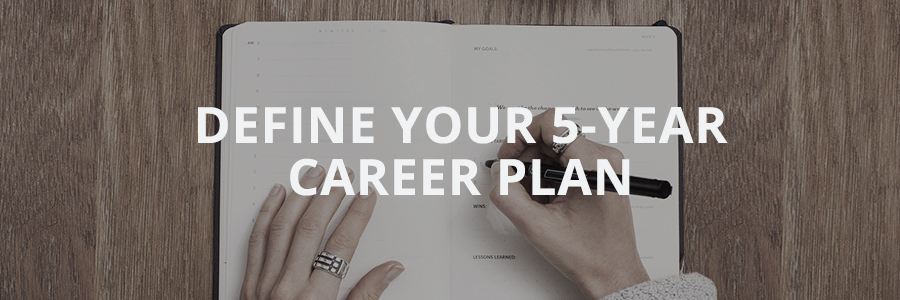Define Your 5-Year Career Plan

Few people actually plan their careers, despite the fact that we spend most of our adult lives at work. A well thought-out career plan is a fundamental tool to strategically advance your career, especially in today’s volatile economic and business environment.
Career planning five years ahead may seem daunting and time-consuming, however mapping out career objectives helps to align your ambitions with realistic goals for success in your career. Having a predetermined career strategy equips you to notice and maximise any potential opportunities that come your way.
Your five-year career plan will often reveal what you value most in your career and future, in addition to giving you the tools to seize and create opportunities, and to track your career performance.
Defining your career objectives and having a clear-cut plan in today’s ever-changing environment can be difficult. Job titles and workplace dynamics change constantly. Career paths are no longer linear, as organisations become less hierarchical and worker loyalty decreases. Moreover, there will be more changes in the next five years, which need to be accounted for and leveraged in your career plan.
A modern career planning methodology is required.
Traditionally, defining a career strategy involved visualising yourself in a specific role five years from now and identifying what career objectives need to be achieved to get there. But that role may not exist in 5 years. Modern career planning techniques use short-term goals to stay on track toward a fluid, long-term direction, with regular refreshes to remain current and relevant.
Start defining your five-year career plan with these helpful tips:
1. Develop a long term personal and professional vision
- Ask yourself what you hope to have achieved in five years
2. Set short-term goals
Being able to identify objectives and plan towards them is an art that is difficult to master. Setting goals that are both specific and challenging, but not too hard, results in better goal-completion performance 90% of the time.1
- Career objectives that are specific, but broad enough to accommodate change
- This might include: role description, key responsibilities, salary bracket, working hours and personal goals
3. Devise a continuing learning plan
Lifelong learning should be an integral part of any career plan. According to Brian Tracy, self-development coach and Eat That Frog! author, “Your ability to expand your mind and strive for lifelong learning is critical to your success. By dedicating yourself to learning, you can get ahead in every aspect of your life. All it takes is a commitment.”2
- Stay relevant and enhance your skill set with continued career-based education
4. Regularly re-evaluate what might change in five years
- This might include: job titles, industry norms or new skill requirements
- Make sure your long term direction caters for this
5. Continuously check and realign your career objectives with your definition of career success
- These might include: starting your own business, becoming CEO, changing industry or profession, taking on more responsibilities, earning more, broadening your skill set and knowledge or getting promoted
6. Stay committed
- Write a professional manifesto for the next three to five years
- Give it to your colleagues, friends and family, and ask them to hold you accountable to your career objectives
A career plan is a road map to a more successful future. Set yourself apart by defining the direction your career will move in, the decisions you will make, the milestones you need to achieve, and where you want to be.
Expand your career horizons with an online short course from a world-leading university.
1. Inc.
2. Brian Tracy